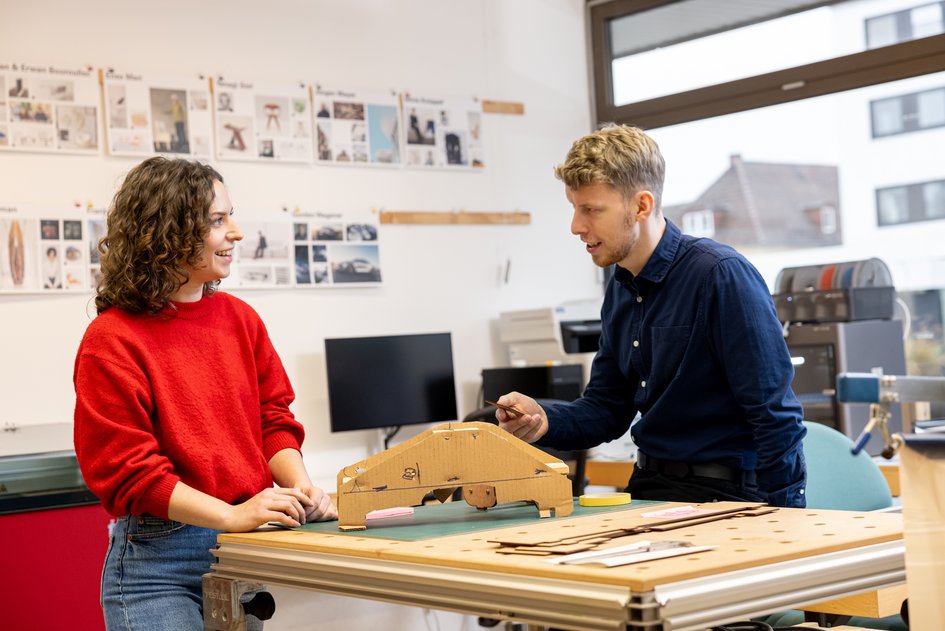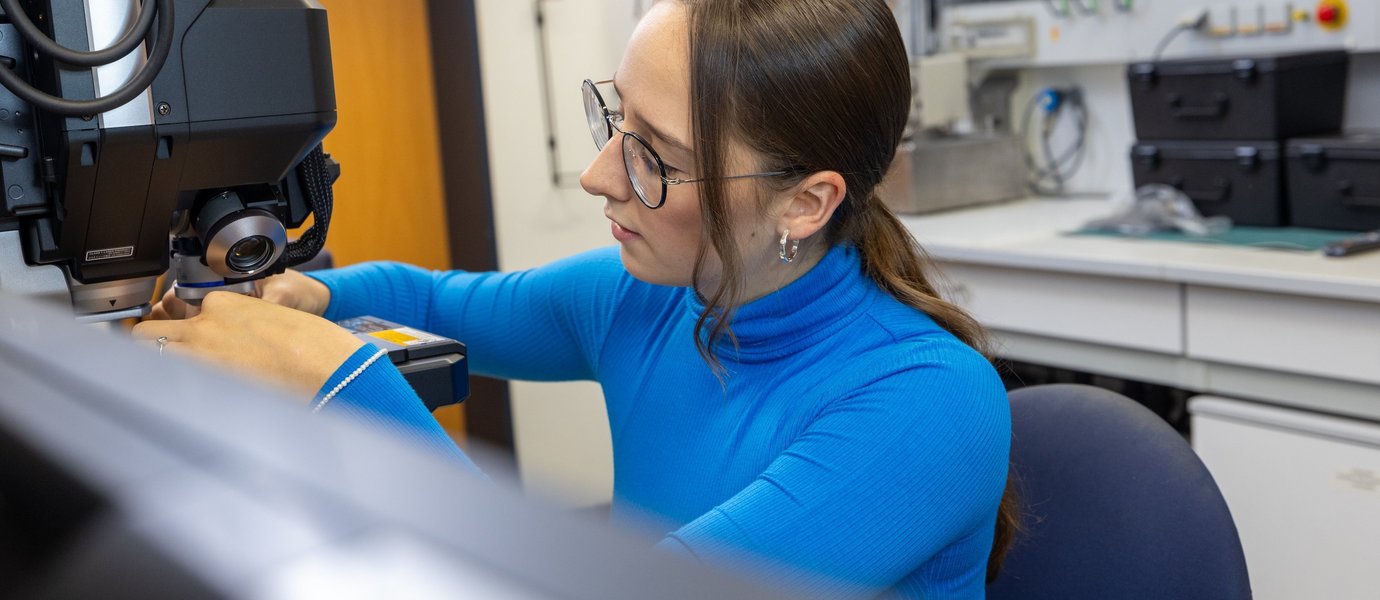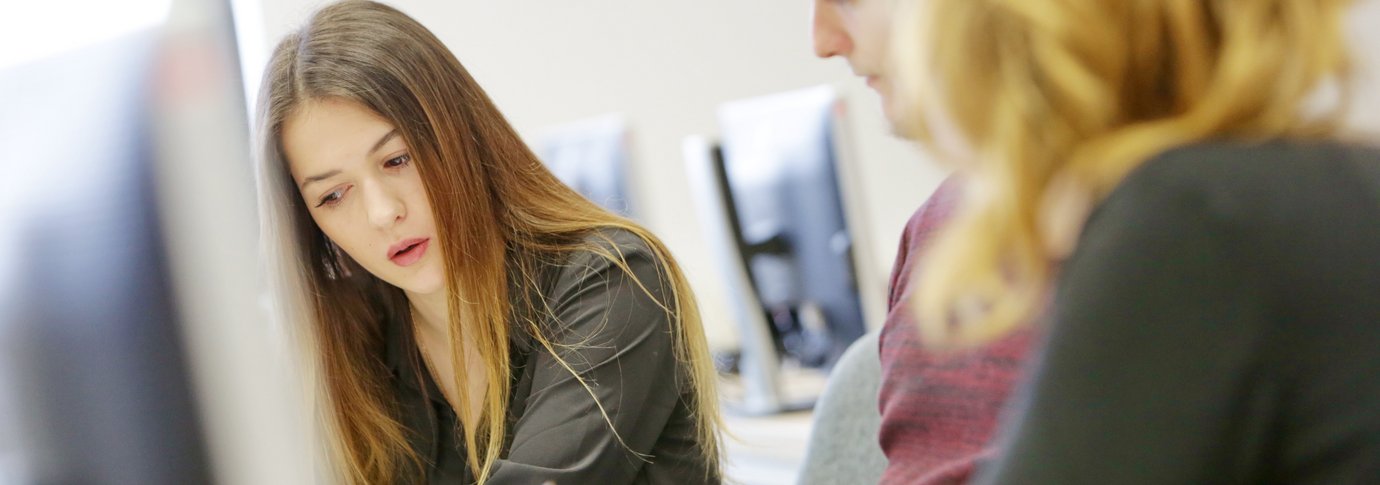Material + Technisches Design
Are you interested in the design of a product and its associated technical use?
The "Material + Technical Design" degree programme combines the subjects of technology, natural sciences, design and diversity under one roof. In order to create products that are both functional and aesthetic, the individual disciplines must harmonise with each other.
Facts at a glance
Why technical design
Your cookie settings have blocked this video.
Design is the creation of the visual appearance of a product and its usability. Design is therefore not just about shape, colour and appearance, but also about ensuring that a product fulfils a function. It is not enough just to have a beautiful exterior, you also have to fulfil technical requirements. Technology tells us how we have to construct something so that it works and we can manufacture it. Design therefore combines functionality and aesthetic product design.
If you study with us, you will work on technical as well as artistic and socially relevant topics.
what sets us apart.
- Strong, practice-orientated course with labs, exercises and case studies
- Up-to-date course content and intensive supervision in small groups as well as project work
- Close professional exchange with the professors and staff
- Accredited degree programmes and a fixed timetable
- High-quality, good contacts with industry partners in the region
- Counselling and support for personal and study-related issues through learning coaching
- Very good entry opportunities for later professional life
- Supplementary university programme: Further education, language courses and a sports and cultural programme

Structure of the study programme
- 1. to 3rd semester: scientific and engineering fundamentals
- 4. and 5th semester: specialised studies, seminars and practical projects in small groups
- 6. 2nd semester: practical phase, Bachelor's thesis and colloquium
In the first semesters, the basics of the individual sub-disciplines of mathematics, physics, chemistry and biology are taught. Building on this, engineering subjects such as technical mechanics, electrical engineering, fluid mechanics and thermodynamics are taught.
In materials science and production engineering, you will learn what a product is made of and how it is made. Knowledge of materials science and production engineering is crucial for construction and design. CAD programmes (Computer Aided Design) and other computer-aided simulations are used for design.
Qualification goals of the degree programme
You will acquire knowledge in the fields of design, engineering, materials science and natural sciences, which you will demonstrate in suitable examination formats. You can apply and understand this knowledge in such a way that it enables professional access to further studies or your profession. You will use scientific methods to develop solutions for complex or new issues in the areas of product design, development and sustainability, which you will then apply directly in your professional practice. You will also incorporate future technologies such as hydrogen technology and modern materials.
You will have skills that you can demonstrate by formulating and substantiating arguments and solving problems in your field of study. You will develop these skills in particular by combining theory and practical application in laboratory courses. You collect and interpret information in order to make well-founded judgements that also take social, scientific or ethical aspects into account.
Through special (rhetorical) and seminar-based courses, you will learn to communicate information, ideas, problems and solutions to both experts and laypeople in an understandable way. You will be able to realistically assess your own abilities, access new sources of information and be prepared to take on responsibility within the scope of your work or profession.
MathsLift - More time for the basics
With MathsLift, you can stretch your first semester over two semesters. MathsLift helps you to improve your maths skills and develop effective learning strategies. It also encourages the formation of learning groups that will support you in the long term.
You decide whether you want to take part in the MatheLift programme at the beginning of the first semester. You can find more information about the programme here.

Typical professional fields of activity
- Product design
- Technical product development
- Construction
- Technical marketing
Possible Master's programme
In addition to the Master's degree programmes offered by the Faculty of Automotive Engineering, you can also take advantage of the wide range of Master's degree programmes offered by Ostfalia or other educational institutions. The Faculty of Automotive Engineering offers 3 Master's degree programmes: Automotive Engineering (external link, opens in a new window), Automotive Systems Technologies (external link, opens in a new window)(part-time programme) and Automotive Service Technology and Processes (external link, opens in a new window).

